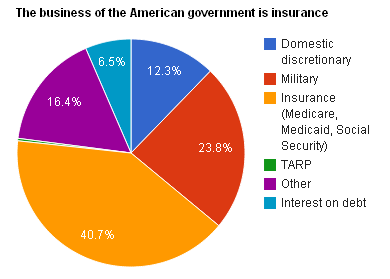The Drive For Ineffective Government
Good chart from Ezra Klein:

But I think this explanation is incomplete:
Politicians don't take the axe to non-defense discretionary spending because they think Teach for America or the food safety infrastructure — both of which the Republicans are proposing to cut dramatically — is more wasteful than the Pentagon or the health-care system. They do it because Teach for America and the food safety system is less politically powerful than the Pentagon or Medicare beneficiaries. The budget ends up like the yard of a man who owns only a lawnmower: The grass is trim, but the trees are overgrown and the ivy is everywhere and the gazebo is falling apart. Yet we keep mowing, because that's what we feel able to do.
That's part of the story, to be sure. But the other thing I would note is that while administrative costs of the regulatory state are only a very small part of the government overall financial commitment they're a very important area of public policy. The conservative coalition in the United States contains a lot of people who don't like paying the taxes that finance Medicare, but few people who have a direct self-interest in old people not getting medicine. By contrast, the conservative coalition really wants the regulatory state's functions to be performed poorly. Even if refusing the pay the electrical bill for the EPA would have a tiny impact on the budget, Koch Industries would still derive massive benefit from inconveniencing environmental regulators. Banks want financial supervision to be done poorly. Employers everywhere smile at the idea of labor law going unenforced for want of bureaucrats to process the complaints. Rich people want IRS tax enforcement to get spottier.
Actually signing your name to the "Make It Easier to Dump Toxic Waste In The River Act of 2012″ is unlikely to play well. But if you impose a nominal spending freeze on the agency charged with enforcing the Clean Water Act, then inflation and economic growth ensure that the level of regulatory supervision will decline. If you impose nominal spending cuts, the level of regulatory supervision declines more sharply. And accomplishing this through the spending channel is a good way of hiding the ball rather than making the case directly that it should be made easier to break the law.


Matthew Yglesias's Blog
- Matthew Yglesias's profile
- 72 followers



